| Srl | Item |
| 1 |
ID:
148572
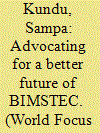

|
|
|
|
|
| Summary/Abstract |
BIMSTEC is a geographically-linked region and there are many problems which are common to BIMSTEC members. To refer from the stated objectives of BIMSTEC, its primary drives include creating an enabling environment for rapid economic development through identification and implementation of specific cooperation projects in the priority sectors; accelerating the economic growth and social progress in the sub-region through joint actions in a spirit of equality and partnership; promoting active cooperation and mutual assistance on matters of common interest in every fields of life including economy, society, science and so on; helping each other through training and research facilities in the educational, professional and technical spheres; cooperating more effectively in joint efforts that can support the national development plans of member nations which result in concrete benefits to the people in increasing their living standards, including employment generation and improved transportation and communication infrastructure; retaining close and beneficial cooperation with existing international and regional organizations with similar aims and purposes and finally, ensure best use of available synergies among BIMSTEC member countries.
|
|
|
|
|
|
|
|
|
|
|
|
|
|
|
|
| 2 |
ID:
148564
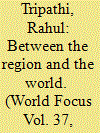

|
|
|
|
|
| Summary/Abstract |
India faces a very complex foreign policy dilemma concerning its regional and multilateral diplomacy today. On one hand it is logical that it should see strengthened regionalism as part of its global push for greater recognition and outreach. Therefore the importance of India’s regional engagements through vehicles such as SAARC, BIMSTEC and related sub regional projects can hardly be ignored. On the other hand its simultaneous thrust towards greater voice in International bodies such as the IMF and World Bank, WTO and even United Nations related agencies is part of a progression that has consistently been part of its foreign policy agenda for long. In between, it continues to pursue transregional initiatives such as BRICS, IORA and partnerships with EU as well as ASEAN.
|
|
|
|
|
|
|
|
|
|
|
|
|
|
|
|
| 3 |
ID:
148583


|
|
|
|
|
| Summary/Abstract |
A major part of the year 2011, following the Jasmine Revolution in Tunisia, witnessed what is popularly known as the Arab Spring- people’s struggle against authoritarian regimes in the Middle East. Similar struggles and wide spread political changes, though not as spectacular as in the Arab world, have swept across South Asian nations since 2008. They might not have caught global attention like the events in the Middle East, but nonetheless, there significance for South Asia region can hardly be overlooked. Beginning with the general elections in Pakistan in February 2008, that put the Pakistan People’s Party at the helm of affairs and that eventually saw the end of General Pervez Musharraf’s military regime of nine years, more fundamental changes were brought about in the two Himalayan Kingdoms of Bhutan and Nepal in quick succession in the same year.
|
|
|
|
|
|
|
|
|
|
|
|
|
|
|
|
| 4 |
ID:
148563


|
|
|
| 5 |
ID:
148584
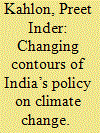

|
|
|
|
|
| Summary/Abstract |
Never before has environment, the most precious heritage of man and the mainstay of development activities been subjected to constant damage as humanity strives to achieve better living standards. The industrialized countries with their economic growth, which means higher greenhouse gas emissions, are obviously guilty of causing global warming. The consequent climate change is posing a significant threat not only to the developmental activities but also to public health. There is a grim prospect of the collapse of life styles in developing countries like India, incase immediate remedial measures are not put in place.
|
|
|
|
|
|
|
|
|
|
|
|
|
|
|
|
| 6 |
ID:
148560


|
|
|
|
|
| Summary/Abstract |
In the coming years, progress in the SREB project would depend on changes at the global level, as well as on the new elite; the youth which is coming up in Central Asia and who may have their own ‘Dreams’.
|
|
|
|
|
|
|
|
|
|
|
|
|
|
|
|
| 7 |
ID:
148570
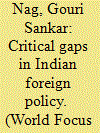

|
|
|
|
|
| Summary/Abstract |
Now a day it has become a fashion to ride on the bandwagon of neo-liberal line as we get to hear talks in which some neophytes project a kind of weltanschauung that ‘it’s time for us to get our business correct and the benefits would be as much ours as it would be for global corporate capital’. So it’s wisdom to put on corporate identity and India should configure her policies not only domestically but also need to reposition internationally. But if one deeply perceives, the lacuna in this logic would be amply clear. It’s because we cannot just get on simply with business hype when the quality of education and the resultant human resource in India are not simultaneously at par with the surging ambition. India spends very less for R&D. So, the next level of reforms cannot be neo-liberal, rather it ought to promote quality education for building quality man power, for neoliberalism only exposes us to compete but it does not enables to compete well. With this reference point what is being sought to suggest is a crucial need to shift our thinking towards addressing educational and skill exchange programme in our current foreign policy lexicon.
|
|
|
|
|
|
|
|
|
|
|
|
|
|
|
|
| 8 |
ID:
148562
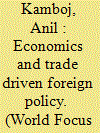

|
|
|
|
|
| Summary/Abstract |
As Indian businesses invest more in SEA for integrating deeper in RVCs and take advantage of the upcoming trade agreements, Indian diplomacy for the region needs to shift its efforts and focus to greater understanding of regional business systems, economic practices and institutions. This is a major imperative given that SEA is preparing to come together as a common market through the ASEAN Economic Community (AEC) framework.
|
|
|
|
|
|
|
|
|
|
|
|
|
|
|
|
| 9 |
ID:
148575


|
|
|
| 10 |
ID:
148561
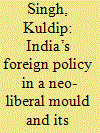

|
|
|
|
|
| Summary/Abstract |
The present paper examines the conduct of India’s foreign policy in neo-liberal paradigm in the post Soviet phase. It looks at forces which resulted in what is called the transition from Cold War era to post Cold War period. It also analyses how Modi Government in search of more intensified engagements with the US, with which its global activism is closely linked, has tried to recast non-alignment. It is argued here that the traditional notion of nonalignment which was seen at odds with close engagements with the US is being shed in a big way though the strategic autonomy is still a key pursuit of India.
|
|
|
|
|
|
|
|
|
|
|
|
|
|
|
|
| 11 |
ID:
148577


|
|
|
|
|
| Summary/Abstract |
India’s Foreign Policy with small island state of Maldives is very important from the strategic point of view in South Asia. The geographical distinction of the island-state also generates a different type of security consciousness, which is different from other states in the Asian subcontinent. Security concerns of small states of the Third World, especially islandstates, arise mainly due to external factors. Their security threats do not originate from other sovereign countries, but from non-state elements such as, transnational mercenaries and terrorists. But Maldives has its own political problems and India’s consistent objective has been the achievement In this context, India continue to be engaged with the Government and the people of small state of Maldives.
|
|
|
|
|
|
|
|
|
|
|
|
|
|
|
|
| 12 |
ID:
148582
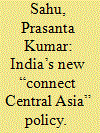

|
|
|
|
|
| Summary/Abstract |
The basic recommendations for India to carry out a Pro-active Approach in its policy is to increase investments, encourage regular talks between the leaders of India and the Central Asian Republics, pushing projects for trade, transport links, educational and cultural exchanges apart from trying to solve tensed relations between India and her neighbours who share borders with the Central Asian Republics.
|
|
|
|
|
|
|
|
|
|
|
|
|
|
|
|
| 13 |
ID:
148566
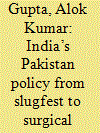

|
|
|
|
|
| Summary/Abstract |
Geography cannot be changed, and it cannot be undone. Pakistan is neighbour to India and Afghanistan is the fact of geography and both these countries have been paying the price for being its neighbour. It is well neigh impossible to calculate the cost of being Pakistan’s neighbour as the country has increasingly become a manufacturing industry of terrorists. More startling fact is that Pakistan is by now a terrorist territory, armed with nukes. World community has come to realize that the most dangerous combination for an eminent threat to world peace continues to be a terrorist with either a dirty bomb in its hand or in possession of a nuclear bomb of any denomination.
|
|
|
|
|
|
|
|
|
|
|
|
|
|
|
|
| 14 |
ID:
148571
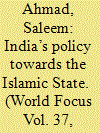

|
|
|
|
|
| Summary/Abstract |
The Islamic State of Iraq and Syria (ISIS) is a Sunni militant jihadist group predominantly active in Iraq and Syria. The group subscribes to an extreme version of Islam and promotes sectarian violence in keeping with its jihadist ideology. All non-Muslims and even Shi’as are denounced by the Islamic State as infidels and apostates. The main ambition of the jihadist group is to create a united, transnational pan-Islamic State, a Shari’a based caliphate, stretching mainly across Iraq and the Levant region.
|
|
|
|
|
|
|
|
|
|
|
|
|
|
|
|
| 15 |
ID:
148567


|
|
|
|
|
| Summary/Abstract |
The above arguments on both sides of debate view ‘strategic autonomy’ in ‘give it up or take it away’ framework, which ignores its dynamic nature, which results from the prevailing strategic scenario and the capability and the desire of states to address the same. Kalyanaraman rightly remarks, that in effect, the practice of strategic autonomy is a function of the power capabilities possessed by a state and of the structure of the international system in a particular historical era. It is true that the principle of ‘strategic autonomy’ has deep ideological moorings in India as its spirit was carried forward under the rubric of non-alignment during cold war. However, this principle should not be taken as an end or a fixed goal post but as the means to realize India’s core national interests.
|
|
|
|
|
|
|
|
|
|
|
|
|
|
|
|
| 16 |
ID:
148574
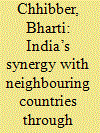

|
|
|
|
|
| Summary/Abstract |
Recent setback notwithstanding it is high time that SAARC should move from potential to performance. Even after three decades of existence SAARC members have failed to cooperate fully and take advantage of regional opportunities. Better infrastructure facilities like development of means of transportation will certainly help. South Asian countries should also abolish non-tariff barriers so that there is free flow of trade apart from cooperation in the area of customs procedures.
|
|
|
|
|
|
|
|
|
|
|
|
|
|
|
|
| 17 |
ID:
148576


|
|
|
|
|
| Summary/Abstract |
Finalizing the ratification of Land Boundary Agreement (2015) is like falling of the “Berlin Wall” between India and Bangladesh which is considered as the golden chapter in their bilateral relationships. The new regimes in Delhi and Dhaka under the leadership of Narendra Modi and Shaikh Hasina respectively have taken the friendship to the highest peak. This is the biggest icebreaker since Indira-Mujib treaty of early 70s. Bangladesh occupies a very important place in the calculation of India’s foreign policy discourse vis-à-vis South Asia. Today, India and Bangladesh are strategic partners in the war against terrorism. They are also largest trading partners in South Asia.
|
|
|
|
|
|
|
|
|
|
|
|
|
|
|
|
| 18 |
ID:
148578
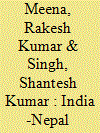

|
|
|
|
|
| Summary/Abstract |
In addition to the issues that have been discussed, there are also various sins of omission and commission which have hurt Indo-Nepal ties. India’s relations with its neighbours in South Asia – all of whom are smaller in size than India – have never been amicable and tension-free. India has often acted as the big brother and not taken adequate notice of how its behaviour is perceived in these countries.
|
|
|
|
|
|
|
|
|
|
|
|
|
|
|
|
| 19 |
ID:
148573


|
|
|
|
|
| Summary/Abstract |
Prime Minister Narendra Modi met U.S. President Barack Obama recently during G-20 Summit held in China.. This was fourth meeting between both the leaders within a span of two years, and it reflected new heights and maturity attained in Indo-U.S. relations. Both the countries also signed long impending historic LEMOA agreement that brought U.S and India further closer to each other. All such developments have the potential of upsetting many countries like Pakistan and China. Things may not remain same as U.S. has just got Donald Trump as their new President Designate. Till now, strategic partnership with U.S. and Japan has resulted into creation of new balance of power situation in the Asia Pacific region. With new President in China things might change in Asia Pacific region.
|
|
|
|
|
|
|
|
|
|
|
|
|
|
|
|
| 20 |
ID:
148579


|
|
|
|
|
| Summary/Abstract |
India is the new buzzword in world politics. India’s economic salience has forced the world to take greater cognizance of India. From domestic quarters in India a question is raised about independent foreign policy position of India in world affairs in the 21st century. Such an apprehension is due to the fact of India’s simultaneous effort to create an alternate world economic order through BRICS Development Bank and continuing strategic bonhomie with the United States of America. This paper argues that new theoretical ventures need to be applied to analyse such extremes.
|
|
|
|
|
|
|
|
|
|
|
|
|
|
|
|